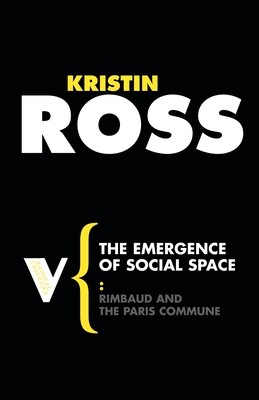
- We will send in 10–14 business days.
- Author: Kristin Ross
- Publisher: Verso
- ISBN-10: 1844672069
- ISBN-13: 9781844672066
- Format: 12.9 x 19.8 x 1.5 cm, minkšti viršeliai
- Language: English
- SAVE -10% with code: EXTRA
Reviews
Description
The 1870s in France - Rimbaud's moment, and the subject of this book - is a decade virtually ignored in most standard histories in France. Yet it was the moment of two significant spatial events: France's expansion on a global scale, and, in the spring of 1871, the brief existence on the Paris Commune - the construction of the revolutionary urban space. Arguing that space, as a social fact, is always political and strategic, Kristin Ross has written a book that is at once a history and geography of the Commune's anarchist culture - its political language and social relations, its values, strategies, and stances.
Central to her analysis of the Commune as a social space and oppositional culture is a close textual reading of Arthur Rimabaud's poetry. His poems - a common thread running through the book - are one set of documents among many in Ross's recreation of the Communard experience. Rimbaud, Paul Lafargue, and the social geographer Ãlisée Reclus serve as emblematic figures moving within and on the periphery of the Commune; in their resistance to the logic and economy of the capitalist conception of work, in their challenge to work itself as a term of identity, all three posed a threat to the existing order. Ross looks at these and other emancipatory notions as aspects of Communard life, each with an analogous strategy in Rimbaud's poetry. Applying contemporary theory, to a wealth of little-known archival material, she has written a fresh, persuasive, and original book.EXTRA 10 % discount with code: EXTRA
The promotion ends in 22d.20:32:16
The discount code is valid when purchasing from 10 €. Discounts do not stack.
- Author: Kristin Ross
- Publisher: Verso
- ISBN-10: 1844672069
- ISBN-13: 9781844672066
- Format: 12.9 x 19.8 x 1.5 cm, minkšti viršeliai
- Language: English English
The 1870s in France - Rimbaud's moment, and the subject of this book - is a decade virtually ignored in most standard histories in France. Yet it was the moment of two significant spatial events: France's expansion on a global scale, and, in the spring of 1871, the brief existence on the Paris Commune - the construction of the revolutionary urban space. Arguing that space, as a social fact, is always political and strategic, Kristin Ross has written a book that is at once a history and geography of the Commune's anarchist culture - its political language and social relations, its values, strategies, and stances.
Central to her analysis of the Commune as a social space and oppositional culture is a close textual reading of Arthur Rimabaud's poetry. His poems - a common thread running through the book - are one set of documents among many in Ross's recreation of the Communard experience. Rimbaud, Paul Lafargue, and the social geographer Ãlisée Reclus serve as emblematic figures moving within and on the periphery of the Commune; in their resistance to the logic and economy of the capitalist conception of work, in their challenge to work itself as a term of identity, all three posed a threat to the existing order. Ross looks at these and other emancipatory notions as aspects of Communard life, each with an analogous strategy in Rimbaud's poetry. Applying contemporary theory, to a wealth of little-known archival material, she has written a fresh, persuasive, and original book.

Reviews